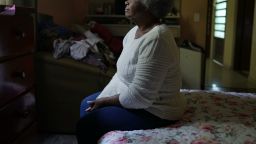I've been living alone now for 12+ years. I can't see getting married, it would severely limit my traveling and social connections. But there are quite a few old college roommates which could work.
This problem is not going to happen to me, my social connections are vast.
Martha Gellhorn on her relationship with Ernest Hemingway
'I do very well without marriage
I'd rather sin respectably any day of the week
Ernest thinks, of course, that marriage saves you a lot of trouble and he is all for it,
I think sin is very clean, there are no strings attached to it'
The latest here:
US adults living alone may face higher risk of cancer death, study suggests
Adults living by themselves may have a higher risk of dying from cancer compared with those who live with others, a new study suggests, and the share of adults in the United States who live alone is on the rise.
The research, published Thursday in the journal Cancer, found that among 114,772 working-age adults who lived alone, 2.5% of them died of cancer during the study period. In comparison, among 358,876 adults who lived with others, a much smaller share — 1.6% — died of cancer in the study. Adults ages 18 to 64 were enrolled in the study and researchers found the strongest association was in those ages 45 to 64.
“We found that working adults living alone had a 1.32 times higher risk of cancer death than adults living with others,” said Dr. Farhad Islami, an author of the study and senior scientific director of cancer disparity research at the American Cancer Society in Atlanta. That suggests that adults living alone have about a 32% higher risk of cancer death.
“Living alone is only one of the components of social isolation, and it may not capture other components like social networks or participation in social activities. But I should say also that living alone is still an important measure,” he said. “This is really important to think about finding ways to reduce the adverse effects of living alone and social isolation, to reduce mortality in this growing population.”
The proportion of people in the United States who live alone has climbed over decades. US Census Bureau data shows that the proportion of one-person households in the United States more than doubled from 1960, when 13% or about 7 million households were single, to 2022, when 29% or about 38 million households were.
The researchers, from the American Cancer Society and the US Department of Health and Human Services, analyzed data, from 1998 to 2019, on more than 470,000 adults from the National Health Interview Survey and the National Death Index, taking a close look at how many of the adults lived alone versus with others and how many died of cancer. The study did not control for the stage of cancer when diagnosed, specific cancer types or treatment regimens.
The adults, ages 18 to 64 when they enrolled in the study, were followed for up to 22 years, from the time they participated in the survey through December 31, 2019. About 24% of them lived alone.
The researchers also pointed out that there were higher proportions of one-person households among Black households than White, Asian and Hispanic households, among young adults and the elderly versus middle age adults, among females than males and among adults with higher education versus those with low education levels.
But the association between living alone and cancer mortality persisted among non-Hispanic White adults and adults with higher education levels even after accounting for differences in a wide range of sociodemographic, behavioral, and health characteristics, according to the study.
“Our findings may suggest that stronger social support existed for communities from racial ethnic minority groups and people of lower socioeconomic status and that might have alleviated that association between living alone and cancer mortality in this group, but we need more research on reasons for these differences,” Islami said.
Compared with adults living with others, adults living alone were more likely to have fair or poor self-reported health status, activity limitation, serious psychological distress, severe obesity, smoke cigarettes, or consume alcohol, according to the study.
“These findings underscore the significance of addressing living alone in the general population and among cancer survivors, calling for interventions to reduce adverse effects of living alone and social isolation and further research to identify the underlying mechanisms for this association,” the researchers wrote in their study.
Alone and lonely are not the same
This isn’t the first time that research has found living alone to be associated with increased health risks. Separate studies have previously found that living alone may be associated with a higher risk of being diagnosed with cancer, or even any cause of death.
In May, US Surgeon General Dr. Vivek Murthy released an advisory describing loneliness and social isolation as an epidemic, but social connection can help, serving as a buffer to certain health risks while making communities more resilient.
But living alone does not necessarily mean that someone is lonely or isolated.
More research is needed to identify the exact underlying mechanisms to explain the association between living alone and cancer death, Kathrin Milbury, associate professor of behavioral science at The University of Texas MD Anderson Cancer Center, who was not involved in the new study, said in an email.
“Living with others gives one easy access to human contact. While being well, living alone may be less detrimental. However, people undergoing cancer treatment or dealing with the lasting side effects of treatment may not have the energy to reach out to others, feel uncomfortable going to public places due to appearance changes, or have impaired physical function that reduces their ability to be social. So, those who live alone may be vulnerable to social isolation,” Milbury said in the email.
Get CNN Health's weekly newsletter
Sign up here to get The Results Are In with Dr. Sanjay Gupta every Tuesday from the CNN Health team.
“The biological mechanisms of social isolation are not fully understood; however, humans are social beings, and being isolated creates a state of biological stress that is detrimental to our health when chronically experienced,” Milbury said. “The other mechanism I believe is related to being in a relationship with others, beyond benefiting just from their presence, but receiving their support, care and advocacy.”




No comments:
Post a Comment